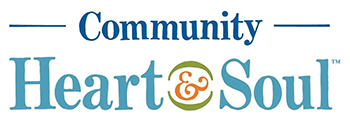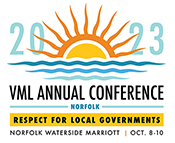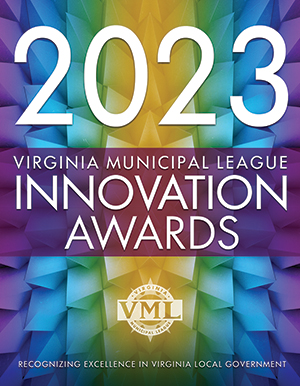eNews – July 21, 2023
DEQ informal comment period, new VML website, Budget appearances can be deceiving...and more!
Friday, July 21, 2023/Categories: eNews
This edition of eNews is sponsored by

Developed and field-tested over a decade in partnership with over 100 small cities and towns across America, Community Heart & Soul is a proven process for engaging a community in shaping its future. Community Heart & Soul is a resident-driven process that engages the entire population of a town in identifying what they love most about their community, what future they want for it, and how to achieve it. Read more >
In this issue:
Environment
VML News
Finance & Budget
Transportation
Education
Environment
DEQ informal comment period closes August 21: Updates to Virginia Runoff Reduction Method and total phosphorus load for new development projects
The Department of Environmental Quality (DEQ) is updating the Virginia Reduction Runoff Method (VRRM) to reflect current engineering methods for the control of nonpoint source pollution from land-disturbing activities. A periodic VRRM review and update is required by law and regulation.
A public comment period on DEQ’s proposed VRRM update is open, and DEQ materials regarding the update may be found at https://www.deq.virginia.gov/our-programs/water/stormwater.
The 60-day public comment period runs from June 22 to August 21. Comments may be submitted by email to DEQ at SWMguidance@deq.virginia.gov. Include your name, organization represented, and mailing address and/or email address.
Author: Preston Bryant, Senior Vice President – McGuireWoods Consulting
VML Contact: Mitchell Smiley, msmiley@vml.org
[top of page]
USGS: Nearly half of U.S. tap water tests positive for PFAS
VDH continues PFAS testing this summer
The U.S. Geological Survey (USGS) released a report on July 5, 2023 estimating that 45% of tap water samples taken from more than 700 residences, businesses, and public water treatment facilities tested positive for at least one PFAS compound. The study is the most comprehensive one conducted to date including samples from public and private tap water sources. The study was conducted between 2016 and 2021. The USGS study can be found at https://www.usgs.gov/news/national-news-release/tap-water-study-detects-pfas-forever-chemicals-across-us.
Per- and polyfluorinated alkyl synthetic chemical substances (collectively, PFAS) have been used since the 1940s in the manufacture of many products, including cookware, food packing, outdoor apparel, carpet, paint, cleaning supplies, cosmetics, and more. The U.S. Environmental Protection Agency (EPA) reports that consuming high amounts of PFAS may lead to adverse health effects.
Out of more than 12,000 PFAS compounds, the USGS study tested for only 32, with the most commonly detected being PFBS, PFHxS, and PFOA. The study showed that PFAS exposure was more common in urban populations than rural areas, although it also showed that small public drinking water supplies (serving fewer than 10,000 people) and private wells may be disproportionately affected. The Eastern Seaboard is among the areas with the most common drinking-water PFAS exposure. Drinking water supplies, including groundwater, can be contaminated by PFAS from chemical manufacturing, product manufacturing, firefighting activities, industrial releases, wastewater discharges, and landfills, to name a few.
The EPA proposed in March 2023 a National Primary Drinking Water Standard Rule setting maximum contaminant levels (MCLs) for PFOA and PFOS; it proposed an MCL hazard index approach for other PFAS, including PFBS, PFNA, PFHxS, and GenX. This proposed EPA rule will be finalized in late 2023 or early 2024, with water suppliers having three years to comply.
The USGS study recommends continued national study of PFAS contamination in various geographies and populations, and that more extensive study be conducted in rural areas that may be more dependent upon private wells.
The Virginia Department of Health began PFAS sampling in summer 2021, when it sampled 45 publicly-owned water treatment facilities and detected at least one PFAS compound in 15 facilities. VDH is conducting more extensive PFAS sampling in summer 2023, testing some 400 water treatment facilities. More information on VDH’s PFAS sampling can be found at https://www.vdh.virginia.gov/drinking-water/pfas/.
Author: Preston Bryant, Senior Vice President – McGuireWoods Consulting
VML Contact: Mitchell Smiley, msmiley@vml.org
[top of page]
VML News
VML has a new website; changes coming to eNews
If you’ve visited our site in the past day or so you’ve probably noticed that things look a bit different. That’s because we have officially launched our new website built upon Euclid Technologies’ membership services platform. This means that VML is now able to offer the same kind of user-driven experience that so many of us have come to expect from the organizations and businesses we interact with online every day.
What’s changed?
Aside from the changes to the layout of the site, users are now able to create a profile and access resources, register for VML events, opt-in/out of our newsletter, create and manage job postings, and more! Just login or create an account by clicking on “Dashboard” in the upper right corner. After you’ve logged in you will be able to manage your account from your profile page.
Will I continue to receive eNews?
After this issue, VML will no longer make eNews available to non-members. Members, and those individuals designated as eligible to receive eNews, will be able to opt-in (or opt-out) from their profile page. To get things started, we have automatically opted-in the mayors, councilmembers, managers, and clerks from our member localities as well as the contacts for our partner organizations and Community Business Members. If you have a question about eligibility or need help opting in/out, send a message to Rob Bullington, rbullington@vml.org.
This will be the last edition of eNews published using our old system. To allow time for the transition, the next regular edition of eNews will be published on Friday, August 11.
Where can I find out about opportunities?
As a public service VML will continue to provide notices about grants, offerings, and resources in the News Board section of our website. The News Board is available to everyone. Check back often for the latest postings!
Having trouble or just have questions?
Send an email to VML’s Administrative Assistant Keyara Johnson, kjohnson@vml.org. She will make sure the proper VML staff person receives your message.
[top of page]
2023 Annual Conference registration coming next week!
 Thanks for your patience as we built and rolled out our new website. Now that everything is in place, we are working to post the registration for the 2023 Annual Conference (October 8-10 at the Norfolk Waterside Marriott). We anticipate that it will be live starting mid-week next week. At that time the registration for room blocks will be posted as well.
Thanks for your patience as we built and rolled out our new website. Now that everything is in place, we are working to post the registration for the 2023 Annual Conference (October 8-10 at the Norfolk Waterside Marriott). We anticipate that it will be live starting mid-week next week. At that time the registration for room blocks will be posted as well.
Check our 2023 Annual Conference page for updates.
VML Contact: Katina Lancaster, klancaster@vml.org
[top of page]
Call for entries: 2023 VML Innovation Awards
 The people who make local governments work do so much for their residents with little or no expectation of recognition. That’s why 47 years ago, the Virginia Municipal League launched its “Achievement Awards” to recognize outstanding work being done by local governments across Virginia. The program went on to become Virginia’s highest honor in local government creativity. In 2017 the name was changed to “Innovation Awards”, but the purpose remains the same: To celebrate all that you do to make your city, town, or county a great place to live!
The people who make local governments work do so much for their residents with little or no expectation of recognition. That’s why 47 years ago, the Virginia Municipal League launched its “Achievement Awards” to recognize outstanding work being done by local governments across Virginia. The program went on to become Virginia’s highest honor in local government creativity. In 2017 the name was changed to “Innovation Awards”, but the purpose remains the same: To celebrate all that you do to make your city, town, or county a great place to live!
It’s time again for our members to spotlight programs and individuals that have made a big difference to their residents by creating innovative solutions to address emerging needs.
Learn more about the awards and how to submit your entries here >.
The awards will be presented the evening of Monday, October 9 at VML’s 2023 Annual Conference in Norfolk.
VML Contact: Manuel Timbreza, mtimbreza@vml.org
[top of page]
Finance & Budget
With budgets, appearances can be deceiving
In late June I noted that “For the first time since 2001, it appears that the General Assembly has failed to adopt any changes to the budget.” However, at least one news outlet reported late Wednesday that the lead budget conferees were meeting on Thursday to resume conversations that have been stalled since late February.
Maybe it’s the mid-summer heat but forgive me if I don’t get excited about the latest “news” that a final budget resolution may be near. Consider that the latest speculation about possible movement on the budget comes one day after news reports that the Commonwealth ended FY 2023 with $1.5 billion in additional general fund resources. However, beyond a press statement from the Youngkin Administration, there have been no details behind the most recent general fund revenue report. Those details won’t be released until the Governor reports on year-end revenues next month. All of which makes it difficult to examine and analyze the most recent data on general fund revenues and determine whether these revenues are available for appropriation.
It’s important to keep in mind that surpluses are often committed by law and thus provide little, if any, flexibility for appropriators. I experienced that firsthand in August 2021 when as Secretary of Finance I had to explain to the House Appropriations and Senate Finance Committees that the Commonwealth’s still largest revenue surplus in history – $2.6 billion – was fully committed.
Adding to the uncertainty around available resources, a significant portion of the reported excess will need to be refunded in the current fiscal year that began on July 1, 2023 (FY 2024), according to testimony given by the Secretary of Finance last month. Those refunds are not insubstantial, likely exceeding $700 million, and will come due in FY 2024.
So maybe the latest news will nudge the conferees back to the table and a final budget deal. Then again, maybe that oasis we see on the horizon is just a figment of our collective imagination. All I can say for certain is that I know many of us are hoping that maybe, just maybe, something will get done.
Stay cool everyone!
VML Contact: Joe Flores, jflores@vml.org
[top of page]
Treasury publishes latest data update on SLFRF usage
On July 14, the U.S. Treasury released the most recent data on how recipients are using State and Local Fiscal Recovery Fund (SLFRF) dollars.
This data is based on an analysis of what has been reported to Treasury through March 31, 2023.
For a quick snapshot of the data, you can view Treasury’s reporting dashboard and interactive map.
Over 92,000 projects have been captured in the April 2023 Project and Expenditure Reports.
VML Contact: Michelle Gowdy, mgowdy@vml.org
[top of page]
Transportation
CTB and Secretary Miller seek to improve locally administered projects with scorecards
This week, the Commonwealth Transportation Board (CTB) and Secretary of Transportation Shep Miller discussed ways to improve delivery and budget performance of transportation projects administered by localities. According to the latest data presented to the CTB by VDOT’s chief engineer only 50 percent of locally administered transportation projects were delivered on time. This is a slight decrease from 2022 and a 6 percent decrease in on-time performance since 2021. This is the second year that locality performance on project delivery has been identified as a concern.
Several CTB Members noted that locally administered projects have similar on-budget performance as VDOT projects and that localities evaluate project completion in a manner different from VDOT that is more dependent on the type of project.
Regardless, Secretary Miller announced the development of locality scorecards to help track project budgets and project delivery performance with greater precision. Secretary Miller emphasized that he believes only a handful of localities are having difficulty delivering projects in a timely manner, but these localities are significantly impacting the statewide metric VDOT uses to track all projects whether they are administered by VDOT or locally. The secretary expressed optimism that the score cards will help focus VDOT’s outreach to localities. He also credited several localities for having already improved their project delivery performance after outreach from VDOT.
The locality scorecards are being developed and are expected to be rolled out in the coming months. VML will provide further updates on the scorecards as more information becomes available.
VML Contact: Mitchell Smiley, msmiley@vml.org
[top of page]
Education
JLARC report: SOQ formula does not align with true cost of education
The Joint Legislative Audit and Review Commission (JLARC) met on July 10th to present findings from the JLARC report about the K-12 education funding formula and the Standards of Quality (SOQ). This study concluded that the formula is greatly skewed due to using old data from the “great recession” (2007-2009). The flawed formula means that the current SOQ structure provides inadequate funding for benchmarks, staffing needs, compensation costs, and student enrollment.
For decades, VML and other stakeholders have held that the SOQ formula does not align with the true cost of education. Using outdated numbers in the formulation of funding has a lasting impact on the amount of funding each school division receives, further perpetuating the gap between what the state is paying and what the state should be paying. The financial burden to localities of providing education is climbing at an exponential rate. When this situation is coupled to inflation, the local “match” becomes a local portion unmatched by the state.
JLARC provides 20 recommendations with 5 policy options ranging from short-term to long-term solutions. These recommendations include several items for which VML has strongly advocated: eliminate the support cap, provide funding for additional staff, and update re-benchmarking.
The full report, summary, and related information is available on the JLARC website here >.
VML Contact: Josette Bulova, jbulova@vml.org
[top of page]
Early Childhood Care and Education Commission meets
On July 20, the Early Childhood Care and Education Commission met for the first time since it acquired its new name. This Commission was created during the 2023 General Assembly Session and is made up of legislators, parents, superintendents, local government representatives, council members, and other stakeholders.
The July 20 meeting served as an introductory session that outlined the goals of the commission. Members also heard a presentation from the Department of Education: “Virginia’s Early Childhood Care and Education System”.
VML Contact: Josette Bulova, jbulova@vml.org
[top of page]